Japan: The Top News Stories of 2024
Newsfrom Japan
Society Economy Politics Sports Culture- English
- 日本語
- 简体字
- 繁體字
- Français
- Español
- العربية
- Русский
January
A 7.6-magnitude earthquake strikes the Noto Peninsula in Ishikawa Prefecture on New Year’s Day, causing shaking of level 7 on the Japanese seismic intensity scale in the municipalities of Wajima and Shika, and triggering tsunami along the Japan Sea coast. As of December 24, 2024, there were 489 fatalities, including disaster-related deaths. Record rainfall in the area from September 21 to 23 causes a further 15 deaths.
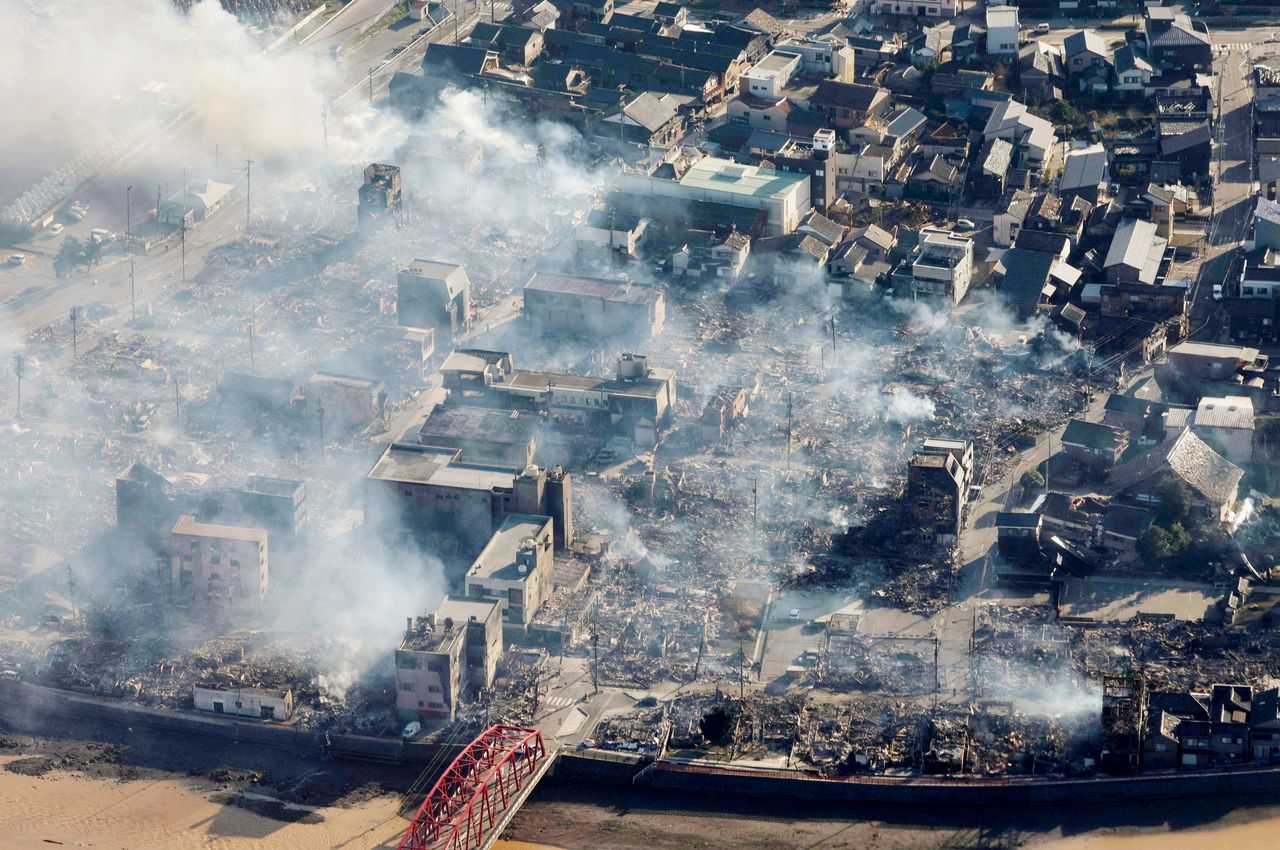
Smoke rises from houses in Wajima on January 2, 2024, from fires sparked in the wake of the Noto Peninsula earthquake. (© Jiji)
Miyazaki Hayao’s The Boy and the Heron wins the Golden Globe Award for Best Animated Feature Film on January 7. It also picks up awards for character animation and storyboarding at the Annie Awards on February 17.
The Japan Aerospace Exploration Agency’s SLIM lunar lander touches down on the moon on January 20, making Japan the fifth country to achieve a successful soft landing of a spacecraft on the lunar surface; the craft achieves a pinpoint landing, within 100 meters of its target.
February
The Cabinet Office publishes figures on February 15 indicating that Japan’s GDP was ¥591.5 trillion ($4.21 trillion) in 2023, dropping the country into fourth place in the global ranking behind Germany, which had a GDP of $4.46 trillion.
Taiwan Semiconductor Manufacturing Co. holds an opening ceremony for its first Japanese plant in Kikuyō, Kumamoto, on February 25. The site is slated to start making semiconductors by the end of the year. Construction of a second plant on an adjacent site is set to begin by March 2025.
March
The Boy and the Heron is named Best Animated Feature at the Academy Awards on March 10, and Godzilla Minus One, directed by Yamazaki Takashi, wins the award for Best Visual Effects.
A 125-kilometer extension to the Hokuriku Shinkansen between Kanazawa in Ishikawa and Tsuruga in Fukui opens on March 16.
The Bank of Japan announces on March 19 that it is ending its policy of negative interest rates, stating that inflation seems set to remain around 2%. At its July 31 policy meeting, the BOJ announces it will increase interest rates from 0%–0.1% to 0.25%.
On March 22, Kobayashi Pharmaceutical announces a recall of five of its health food products containing beni kōji (red yeast rice) due to health problems among users. Chairman Kobayashi Kazumasa and President Kobayashi Akihiro resign on July 23 after the Ministry of Health, Labor, and Welfare releases a report linking the company’s products to 97 deaths. On September 18, the MHLW identifies puberulic acid derived from blue mold as the cause of kidney damage among users.
April
On April 4, the Liberal Democratic Party punishes 39 members involved in a kickbacks scandal. Shionoya Ryū, former head of the LDP General Council, and Seko Hiroshige, former secretary general for the LDP in the House of Councillors, are asked to leave the party. Faction leader Nikai Toshihiro, evades punishment despite having the largest total unreported income by having previously announced that he will not run in the next election.
At an extraordinary meeting on April 12, US Steel shareholders approve a $14.1 billion (¥2.2 trillion) acquisition by Nippon Steel. However, the United Steelworkers union protests the move and there is widespread opposition within the United States. The Committee on Foreign Investment in the United States leaves the matter undecided when it fails to reach a final agreement in December.
The yen falls dramatically on April 29 while the Tokyo Stock Exchange is closed for a national holiday, dropping past 160 to the dollar, its lowest level since April 1990. The Ministry of Finance intervenes in the market, spending more than ¥9.7 trillion from late April to late May and more than ¥5.5 trillion from late June to late July, after the yen falls below 160 again. From November to December, the yen is at between 150 and 160.
May
On May 8, Toyota announces an operating profit of ¥5.4 trillion for the financial year ended March 2024 on strong hybrid sales and a weak yen. It is the first time for a Japanese automaker to top ¥5 trillion.
Prime Minister Kishida Fumio meets Chinese Premier Li Qiang and South Korean President Yoon Suk Yeol at the Blue House in Seoul on May 27, in the first such three-way summit since December 2019.
June
Emperor Naruhito and Empress Masako make a week-long official visit to Britain from June 22, meeting with King Charles III and Queen Camilla.
July
On July 3, the Supreme Court rules in a unanimous decision that the former Eugenic Protection Act was unconstitutional and orders the government to pay damages to victims of forced sterilization under the law.
The Bank of Japan on July 3 issues new banknotes for the first time in 20 years. Shibusawa Eiichi features on the ¥10,000 bill, Tsuda Umeko on the ¥5,000 bill, and Kitasato Shibasaburō on the ¥1,000 bill.
Also on July 3, final results of the spring wage offensive from the Japanese Trade Union Confederation (Rengō) find that the weighted average of wage increases was 5.10%, exceeding 5% for the first time since 1991 and marking a 1.52 percentage-point increase from the previous year. The average wage increases at small and medium-sized companies, with fewer than 300 labor union members, was 4.45%, up 1.22 percentage points.
Incumbent Koike Yuriko wins the Tokyo gubernatorial election on July 7 to secure a third term. Ishimaru Shinji, the former mayor of Akitakata, Hiroshima, wins 1.65 million votes to finish second, buoyed by his online popularity rather than the support of a political party. The internet is also a major factor in Saitō Motohiko’s reelection as governor of Hyōgo Prefecture on November 17 after he resigned following a unanimous vote of no confidence from the prefectural assembly concerning allegations of abuse of power.
The Nikkei index rises above 42,000 on July 11, reaching a record high after starting the year at around 33,000. On August 5, it plummets by more than 4,000 points, setting a new record for a one-day loss, but recovers much of its value the following day. The index hovers between 38,000 and 40,000 in November and December.
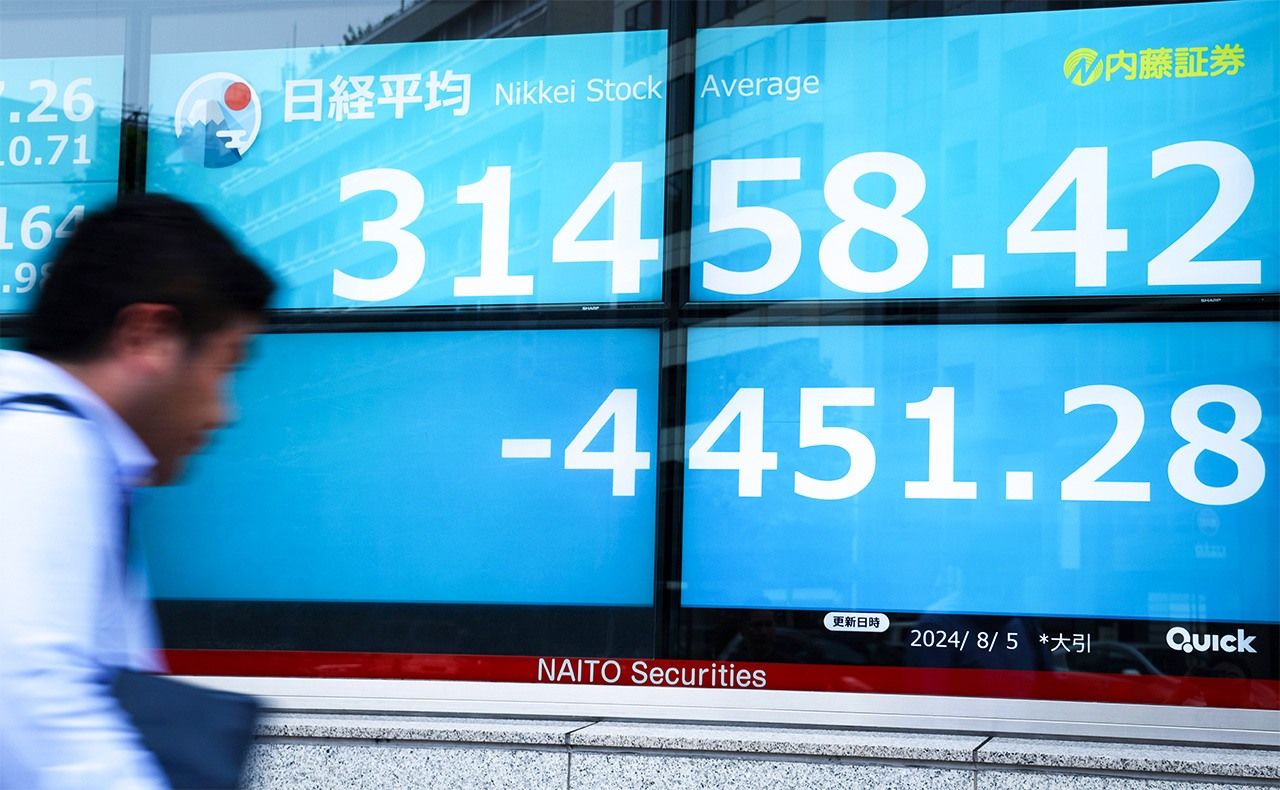
A board in Tokyo shows the closing price of the Nikkei index down 4451.28 points on August 5, 2024. (© Jiji)
The World Heritage Committee of UNESCO adds the Sado Island Gold Mines in Niigata Prefecture to the World Heritage list on July 27.
August
A magnitude 7.1 earthquake centered off the coast of Miyazaki Prefecture produces shaking of up to lower 6 seismic intensity on August 8. In response, the JMA announces its first ever megaquake alert, warning of a potential temblor along the Nankai Trough. The alert is lifted on August 15 but has a dampening effect on summer tourism.
The Paris Olympics draw to a close on August 11. Japan finishes with 20 gold, 12 silver, and 13 bronze medals. This is its second highest number of gold medals and overall medal total after the Tokyo Olympics held in 2021. Kitaguchi Haruka’s gold medal for the women’s javelin throw on August 10 makes her Japan’s first medal winner in a women’s field event.
Due to ongoing stagnant support, Prime Minister Kishida announces on August 14 that he will not stand in the upcoming LDP leadership contest, effectively stepping down as premier. In the September 27 leadership contest, Ishiba Shigeru is elected as the new president of the party, defeating Takaichi Sanae in the runoff after finishing second to her in the first round of voting.
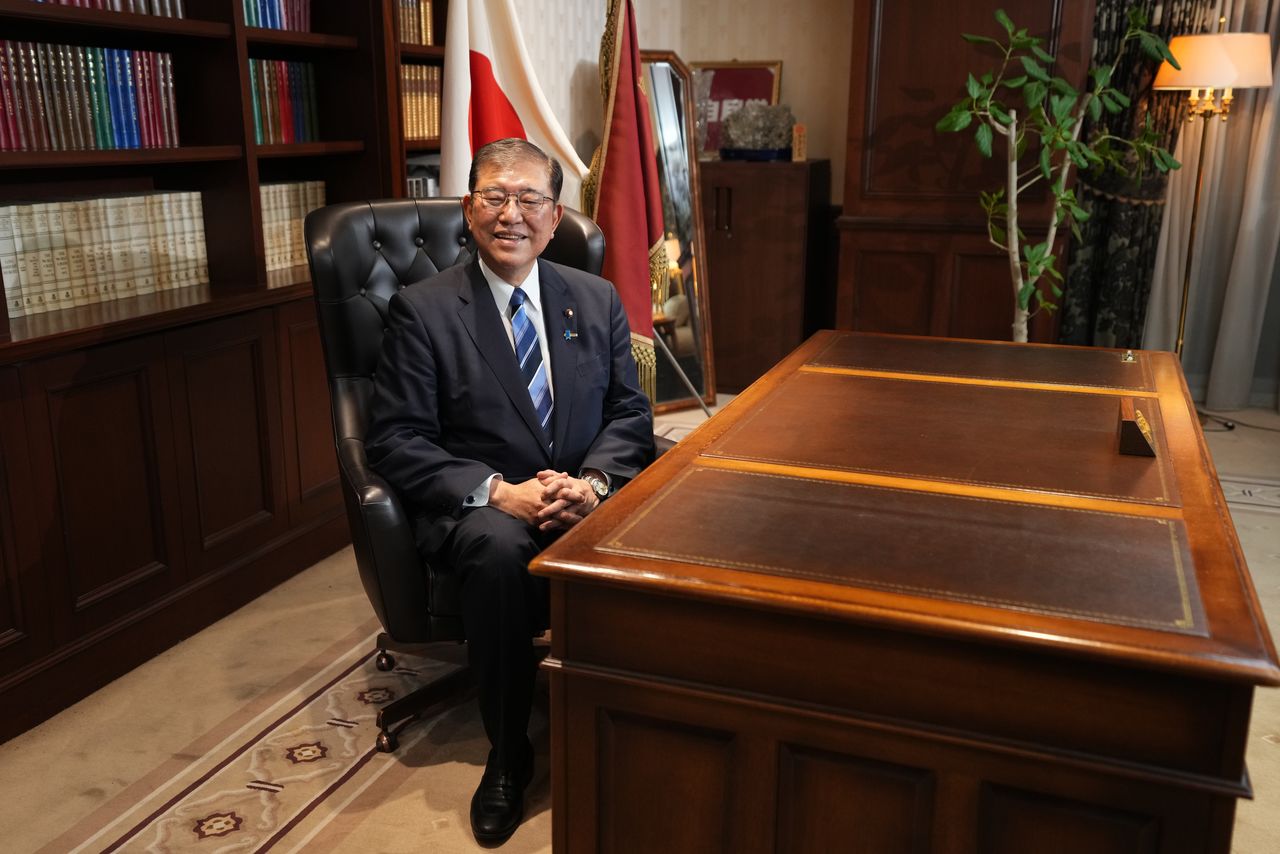
Ishiba Shigeru sits at the Liberal Democratic Party president’s desk on September 27, 2024. (© Jiji)
Natural disasters are a factor in rice shortages in urban supermarkets from mid-August to late September, ahead of the availability of the new year’s harvest. Retail prices for the staple also rise from between ¥2,000 and ¥3,000 per five kilograms in 2023 to more than ¥3,000.
Tokyo Electric Power Company begins preparatory work for experimental removal of melted nuclear debris at Fukushima Daiichi Nuclear Power Station on August 22. TEPCO announces on November 7 that it has completed the trial removal of a 0.7-gram sample.
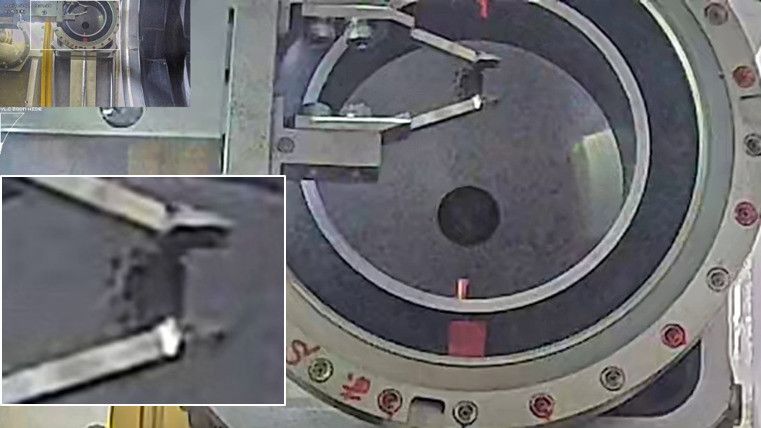
A 0.7-gram sample of nuclear debris removed from Fukushima Daiichi Nuclear Power Station and stored in a special container. (Courtesy Tokyo Electric Power Company; © Jiji)
September
Shōgun wins 18 Emmy awards on September 15, including Outstanding Drama Series, Outstanding Lead Actor in a Drama Series for Sanada Hiroyuki, and Outstanding Lead Actress in a Drama Series for Anna Sawai.
In his first season after moving to the Los Angeles Dodgers, Ohtani Shōhei makes history on September 19 by becoming the only major leaguer ever to achieve 50 stolen bases and 50 home runs in one season. The Dodgers go on to defeat the New York Yankees in game five of the World Series on October 30 to become MLB champions, and on November 22, Ohtani wins the Most Valuable Player award for the National League.
On September 20, China and Japan agree to work together toward the resumption of Chinese imports of Japanese marine products. On November 15, Prime Minister Ishiba meets with Chinese President Xi Jinping for the first time on the sidelines of the Asia-Pacific Economic Cooperation summit in Lima, Peru. The two leaders pledge to work toward mutually beneficial strategic ties.
The Constitutional Democratic Party of Japan elects former Prime Minister Noda Yoshihiko as its new leader on September 23. Ishii Keiichi becomes leader of Kōmeitō on September 28, but loses his seat in the October 27 election and is replaced by Saitō Tetsuo on November 9. Nippon Ishin no Kai’s disappointing election performance leads to Yoshimura Hirofumi replacing Baba Nobuyuki as leader on December 1.
Hakamata Iwao, who was sentenced to death in 1980 for the killing of four people in 1966, is acquitted 58 years after the incident in a retrial at the Shizuoka District Court on September 26. The court rules that investigators fabricated evidence. On October 9, the verdict is finalized after prosecutors decide not to appeal.
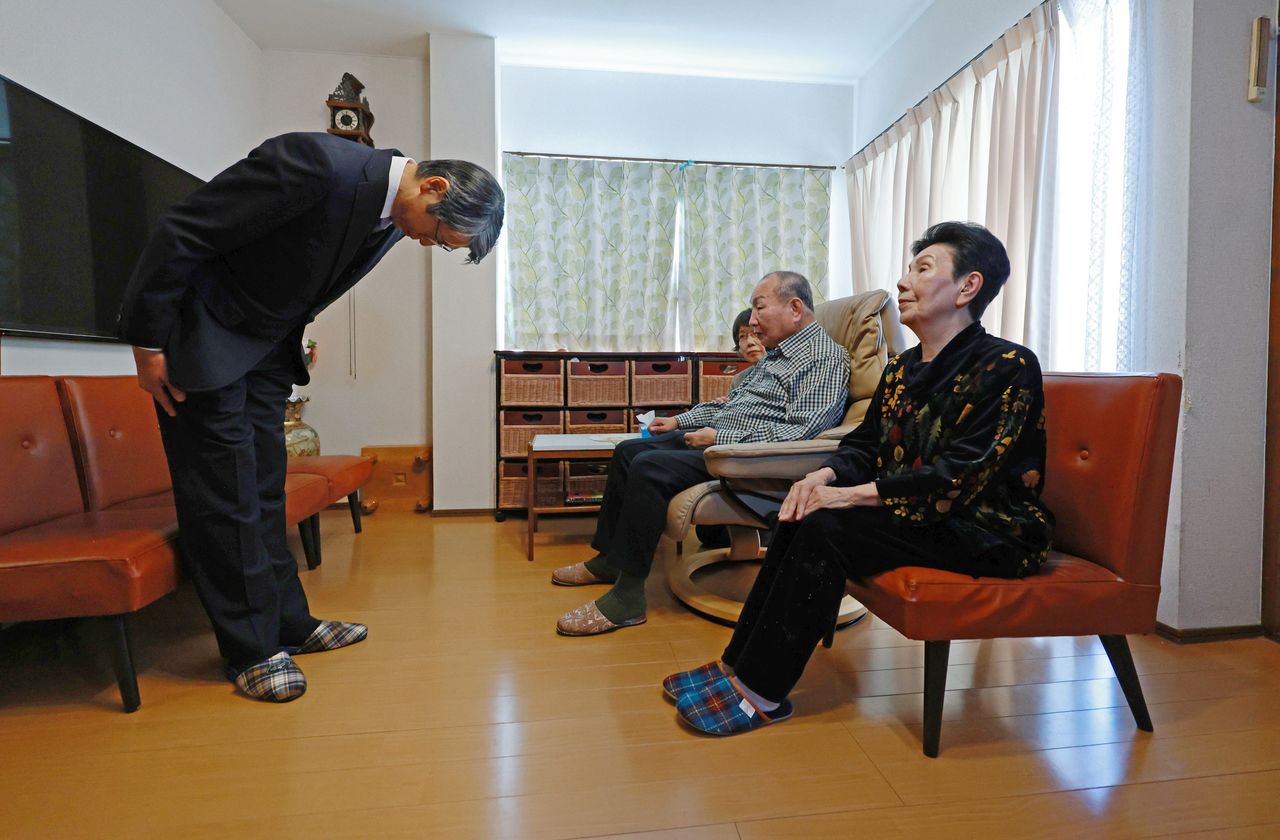
Yamada Hideo, the head of the Shizuoka District Public Prosecutors Office (at left) apologizes to Hakamata Iwao (center right) in Hamamatsu, Shizuoka, on November 27, 2024. (© Jiji; pool photo)
October
Ishiba Shigeru becomes prime minister on October 1, dissolving the House of Representatives eight days later. In the October 27 election, the LDP wins 191 seats and Kōmeitō 24, giving the ruling coalition a total of 215 seats, short of the 233 required for a majority. The CDPJ makes major gains, with its total rising 50 seats to 148, while the Democratic Party for the People quadruples its strength from 7 to 28 seats.
Nihon Hidankyō (the Japan Confederation of A- and H-Bomb Sufferers Organizations) is awarded the Nobel Peace Prize on October 11 “for its efforts to achieve a world free of nuclear weapons and for demonstrating through witness testimony that nuclear weapons must never be used again.” In his speech, representing the group at the December 10 award ceremony, Tanaka Terumi called on “everyone around the world to discuss together what we must do to eliminate nuclear weapons, and demand action from governments to achieve this goal.”
November
Nissan announces on November 7 that it will reduce its global vehicle production capacity by 20% and its workforce by 9,000 people. On December 18, it emerges that Nissan and Honda are discussing a merger, with Mitsubishi Motors possibly joining in the future. If the three companies merge, they will become the world’s third-largest automaker with annual sales of 8 million vehicles.
December
On December 4, UNESCO adds “traditional knowledge and skills of sake-making with kōji mold in Japan” to its list of Intangible Cultural Heritage of Humanity.
On December 24, legislative changes on political funding are enacted in the Diet, including the abolition of “political activity funds” received from parties, which could be used by politicians without disclosing what for. A decision on whether to abolish donations from corporations and other bodies is postponed until the end of March 2025.
(Translated from Japanese. Banner photo: Nihon Hidankyō representatives (from left) Tanaka Terumi, Tanaka Shigemitsu, and Mimaki Toshiyuki at the Nobel Peace Prize award ceremony in Oslo on December 10, 2024. © Jiji.)
